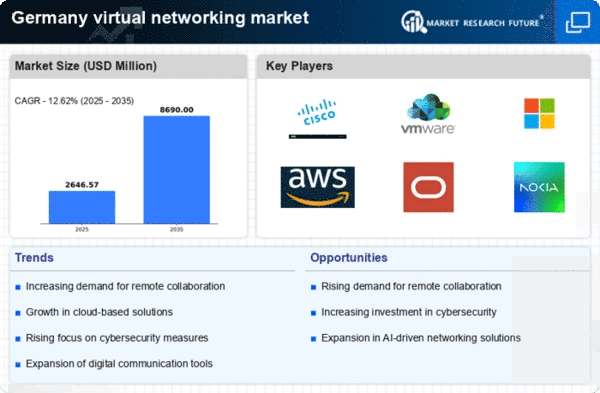Emergence of 5G Technology
The rollout of 5G technology in Germany is poised to revolutionize the virtual networking market. With its promise of ultra-fast data speeds and low latency, 5G enables more efficient and reliable virtual networking solutions. By 2025, it is anticipated that 5G coverage will reach over 80% of the population, facilitating the adoption of advanced applications such as virtual reality and augmented reality in networking. This technological advancement could lead to a paradigm shift in how organizations utilize virtual networking tools, enhancing user experiences and operational capabilities. The virtual networking market is likely to see substantial growth as businesses leverage 5G to optimize their networking strategies.
Expansion of Digital Infrastructure
Germany's commitment to enhancing its digital infrastructure significantly impacts the virtual networking market. The government has initiated various programs aimed at improving broadband connectivity and expanding access to high-speed internet across urban and rural areas. As of 2025, approximately 90% of households are expected to have access to high-speed internet, which is crucial for the effective functioning of virtual networking solutions. This expansion not only supports existing users but also attracts new businesses to adopt virtual networking technologies. The virtual networking market is likely to benefit from this infrastructural development, as enhanced connectivity enables more organizations to leverage advanced networking solutions.
Rising Demand for Remote Work Solutions
The virtual networking market in Germany is experiencing a notable surge in demand for remote work solutions. As organizations increasingly adopt flexible work arrangements, the need for robust virtual networking tools has become paramount. In 2025, it is estimated that around 60% of the workforce in Germany will engage in remote work at least part-time. This shift necessitates reliable and secure networking solutions that facilitate seamless communication and collaboration among remote teams. Consequently, companies are investing heavily in virtual networking technologies to enhance productivity and maintain operational efficiency. The virtual networking market is thus poised for growth, driven by the need for innovative solutions that support remote work dynamics.
Growing Importance of Collaboration Tools
The increasing emphasis on collaboration tools is a key driver for the virtual networking market in Germany. As businesses recognize the value of effective teamwork, there is a rising demand for virtual networking solutions that integrate collaboration features. In 2025, it is estimated that around 70% of organizations will prioritize investments in tools that enhance team collaboration. This trend is indicative of a broader shift towards more interactive and engaging virtual environments. The virtual networking market is responding to this demand by developing solutions that facilitate real-time communication, file sharing, and project management, thereby fostering a culture of collaboration within organizations.
Increased Focus on Data Privacy Regulations
The virtual networking market in Germany is significantly influenced by stringent data privacy regulations, such as the General Data Protection Regulation (GDPR). As organizations strive to comply with these regulations, there is a growing demand for virtual networking solutions that prioritize data security and privacy. In 2025, it is projected that compliance-related investments will account for approximately 25% of IT budgets in German companies. This focus on data protection drives the development of secure virtual networking tools that ensure sensitive information is safeguarded. The virtual networking market is thus adapting to these regulatory requirements, fostering innovation in security features and compliance capabilities.
















